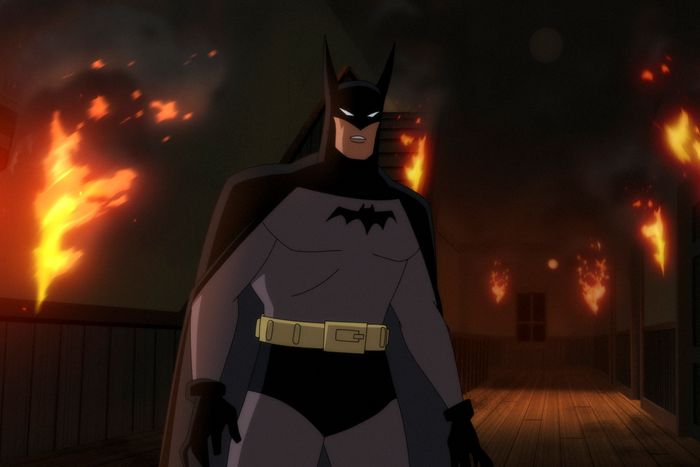
Photo: Prime Video
Batman’s double life allows him to wear a rotating array of faces: billionaire and crime fighter, detective and philanthropist, playboy and furious vigilante. But in the lucidly imagined, crisply animated, generously written Batman: Caped Crusader, Bruce Wayne and his many public and private identities aren’t the main draw. The latest from Bruce Timm, co-creator of the magnificent Batman: The Animated Series, is especially exciting when it looks away from the Dark Knight and his long-established orphan issues to the city around him: to the corruption spreading throughout its streets, the complicity of those entrusted to protect it, and the allure of breaking the law to do something morally right.
Last year, HBO wiped out its neo-noir contingent by canceling both Perry Mason and the then-nascent Caped Crusader, the latter of which Prime Video picked up and already renewed for a second season. These two series share so many common themes, though, that jonesing Perry Mason fans could watch Caped Crusader like it was that series’ lost third season — and that approach would work just fine. Caped Crusader’s mid-century aesthetic: just as full of curved chrome cars, pencil-skirt suits, fedora-wearing baddies, and Art Deco architecture as Perry Mason’s. Gotham City’s police force: just as ethically nebulous as the Los Angeles Police Department. The series’ titans of industry: just as smugly evil as the McCutcheon and Nygaard oil scions. And Batman (voiced by a gravelly Hamish Linklater), public defender Barbara Gordon (Krystal Joy Brown), and lone good cops Commissioner Jim Gordon (Eric Morgan Stuart) and Detective Renee Montoya (Michelle C. Bonilla), Gotham City’s ragtag group of avengers trying to make things right: just as up against impossible odds as PI turned lawyer Perry Mason, legal secretary Della Street, beat cop Paul Drake, and assistant district attorney Hamilton Burger. There’s even a subplot about a disputed land-use deal! What could be more neo-noir than that?
In its 10-episode first season, Caped Crusader takes the foundational aspects of the genre — paranoia, conspiracy, and dramatic chiaroscuro visuals — and gives them a spin recognizable to Batman fans but not limiting to newbies. That attempt to appeal to viewers with varying levels of Dark Knight knowledge means that nearly each episode involves a character introduction of some kind, and yes, we do get another version of Thomas and Martha Waynes’ murders. But the pacing is zippy; the animation is lush and textured, especially when the series, unexpectedly and wonderfully, veers into the supernatural; and the characterization tweaks are inspired, especially those that will make the most narrow-minded people mad. The Penguin is now a no-nonsense woman, Oswalda Cobblepot (Minnie Driver), who runs a gambling ship on which she performs a burlesque-style stage act. Montoya’s queerness, a change from Batman: The Animated Series for the character’s arc in subsequent comic series, is maintained here. And in the change most reflective of Caped Crusader’s interest in exploring whether class-based vengeance is the only way to puncture Gotham City’s entrenched gloom and avarice, Dr. Harleen Quinzel’s motivations as Harley Quinn (Jamie Chung) have a distinctly eat-the-rich feel.
The suggestion that Batman is actually the cause of so much unrest in Gotham rather than a deterrent or cure isn’t new; everything from Batman: The Animated Series to films by Tim Burton, Christopher Nolan, and Matt Reeves have poked at that idea to varying degrees. (Reeves is an executive producer here too.) But Caped Crusader takes a risk in making Batman so devoted to his bland Casanova cover that he initially can’t quite understand exactly why so many of Gotham’s criminals would resort to extreme methods if placed under economic duress or witness to injustice, and head writer Ed Brubaker and his team use that unexpected moral quandary as narrative fuel. This Batman is first a bit of a hard case, someone empathetic toward children but not to many others — until he realizes the extent to which Gotham City’s public servants have crept over the line of illegality. The way that knowledge shakes his hard shell of trauma, sarcasm, and a little bit of cynicism puts him in line with Perry Mason and so many other noir heroes whose compassion grows in relation to the depths of the conspiracies they reveal.
But Caped Crusader ends on a series of questions that nod at the more nihilistic side of this genre, too: If Batman is an extension of a flawed system, does his heroism have a limit? If he’s unwilling to blow up the system entirely to remove its bad actors, then is he more like the rule-bending but self-involved Harvey Dent (Diedrich Bader) than the extremist but consistently principled Harley Quinn? Do Batman’s prejudices preclude him from ever seeing eye to eye with public defender Barbara, who believes everyone deserves a second chance? Caped Crusader doesn’t hammer home its suggestion that Batman’s conservatism could be his greatest weakness, but the series smartly maneuvers his straitlacedness as an obstacle and his enemies’ ideologies as a lure. In its consideration of the effort required to change the status quo, Caped Crusader makes room under its spotlight for how the other half lives.

